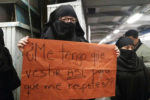A few weeks ago, Jonah Goldberg wrote an op-ed claiming that feminism’s work in the West is “mostly done” and that’s it’s time to take feminism “overseas” to Muslim women.
We disagree.
Diana: Where do you begin in tearing apart Jonah Goldberg’s “Talking feminism overseas?” I can almost see Gayatri Spivak shaking her head as she waves her finger back and forth, saying as she has before, “white men saving brown women from brown men.” So much for novelty in the discourse surrounding “third world women.” Can someone please throw something new at us?!
Azra: I’ll admit, after reading Jonah Goldberg’s article, I had to read it again (unfortunately), as I considered the chance that it was an excellent piece of farce. If only that were the case…
Sara: Oh, please, Jonah. Feminism is hardly a completed project in the United States. Who hasn’t ratified CEDAW yet? Measuring access to rights by national boundaries is problematic for a number of reasons. First and foremost, the oasis of equality that Goldberg mentions is a myth, and really only applies to certain groups. The rights of women change according to socioeconomic factors and race. Drawing empowerment or access to rights through national boundaries or groups pushes injustice into invisibility. Saying that the “work is done” is a flat-out insult to the work of modern American feminists.
Azra: Is feminism over in the United States? I think there are other women who have more eloquently addressed this assertion before. But I will say a few things: 2/7 LA Times Oped columnists are women. In 2011, 16.4% of US Congress members are women—irrespective of their political leanings. As for health outcomes, women are more susceptible to experiencing mental health conditions than men and are more likely to die of heart disease than men in the United States. The situation is even direr if you are a woman who also belongs to an oft-marginalized group—be it based on religion, sexual orientation, or race.
Fatemeh: And we haven’t even talked about the rates of violence against women in the U.S. Does he honestly think that feminism in the U.S. is just about getting a college degree and making as much money as a man? What about the endemic rates of domestic violence, rape, and harassment?!
Azra: Neglecting to look at how women in the United States are disadvantaged due to societal expectations seems to have become increasingly en vogue over the past few years. As Americans look abroad to countries undergoing massive political change and conflict, some have condescendingly appointed themselves cultural experts of international gender relations—with a particular interest in Muslim women’s lives. It’s an excellent way to overlook social inequalities American women face here at home and instead look at an “other “ (and hence worse) social inequality faced by Muslim women.
Sara: I do not deny the lack of protection that many Muslim women abroad have, and how religion and culture are used to abuse the rights of women. The fight for equality is not the fight for an “enlightened outsider,” but rather based on giving the right tools to those who want to fight injustice in their communities. At the end of the day, what is most important is to protect the rights of individuals. What really matters is not what faith women practice, or outsourcing Western feminists to save “poor Muslim women,” but actually giving women the tools to fight for their own rights, as defined by themselves.
Diana: Goldberg’s narrow construction of Muslim women as segregated and subjugated through a few cited cases undermines the work that Muslim women overseas are doing for themselves. The reality he overlooks is that women’s equality is already a battle being fought in foreign lands by those women. This fight is so specific to these women that only they have the power to authoritatively negotiate matters of agency from within the framework of existing cultural, social and religious norms, which bear some value to these women, despite the constant scorn heaped on them.
Azra: I’m not sure why Mr. Goldberg doesn’t just come out and say that he means exporting his version of feminism to Muslim women abroad. Because in almost every paragraph following his declaration for exportation, I read some reference to how Muslim women needed to be saved from the specter of sex-crazed, violent Muslim men.
Fatemeh: As if all Muslim women “over there” are cowering in the shadows and waiting for someone to come save them. Ugh.
Diana: Goldberg, don’t tire us with clichéd rhetoric, stop recycling Laura Bush’s campaigns, and please stop stealing the oomph from “behind the veil.”
Azra: God forbid these women—no, ANY woman—be subject to Mr. Goldberg’s definition of feminism.



